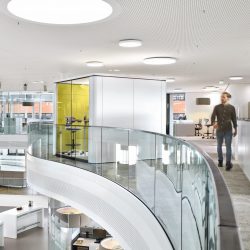To provide the best experiences, we use technologies like cookies to store and/or access device information. Consenting to these technologies will allow us to process data such as browsing behaviour or unique IDs on this site. Not consenting or withdrawing consent, may adversely affect certain features and functions.
The technical storage or access is strictly necessary for the legitimate purpose of enabling the use of a specific service explicitly requested by the subscriber or user, or for the sole purpose of carrying out the transmission of a communication over an electronic communications network.
The technical storage or access is necessary for the legitimate purpose of storing preferences that are not requested by the subscriber or user.
The technical storage or access that is used exclusively for statistical purposes.
The technical storage or access that is used exclusively for anonymous statistical purposes. Without a subpoena, voluntary compliance on the part of your Internet Service Provider, or additional records from a third party, information stored or retrieved for this purpose alone cannot usually be used to identify you.
The technical storage or access is required to create user profiles to send advertising, or to track the user on a website or across several websites for similar marketing purposes.
 Many managers still rely on gut feelings and inadequate or flawed data to make important but potentially poor decisions about real estate and flexible working. That is the main conclusion of a new piece of research by flexible workplace specialist Abintra. Published in a new report, the study highlights how corporations are struggling to manage office space efficiently as the trend towards agile and flexible working gathers momentum.
Many managers still rely on gut feelings and inadequate or flawed data to make important but potentially poor decisions about real estate and flexible working. That is the main conclusion of a new piece of research by flexible workplace specialist Abintra. Published in a new report, the study highlights how corporations are struggling to manage office space efficiently as the trend towards agile and flexible working gathers momentum.












 Employees trust their CEOs less than they did seven years ago, although trust in line managers remains the same, new research claims. It also suggests that one of the reasons for mistrust is that CEOs seem unable to understand the role of their employees and the contributions they make to working culture. According to Trust in Leaders, by The Institute of Leadership & Management, workers trust their CEOs considerably less than they did in 2011, as compared to then, the results show trust in CEOs has fallen by 8 percent.
Employees trust their CEOs less than they did seven years ago, although trust in line managers remains the same, new research claims. It also suggests that one of the reasons for mistrust is that CEOs seem unable to understand the role of their employees and the contributions they make to working culture. According to Trust in Leaders, by The Institute of Leadership & Management, workers trust their CEOs considerably less than they did in 2011, as compared to then, the results show trust in CEOs has fallen by 8 percent.





















May 28, 2019
A sophisticated eye on workplace design
by Mark Eltringham • Comment, Facilities management, Workplace design
(more…)